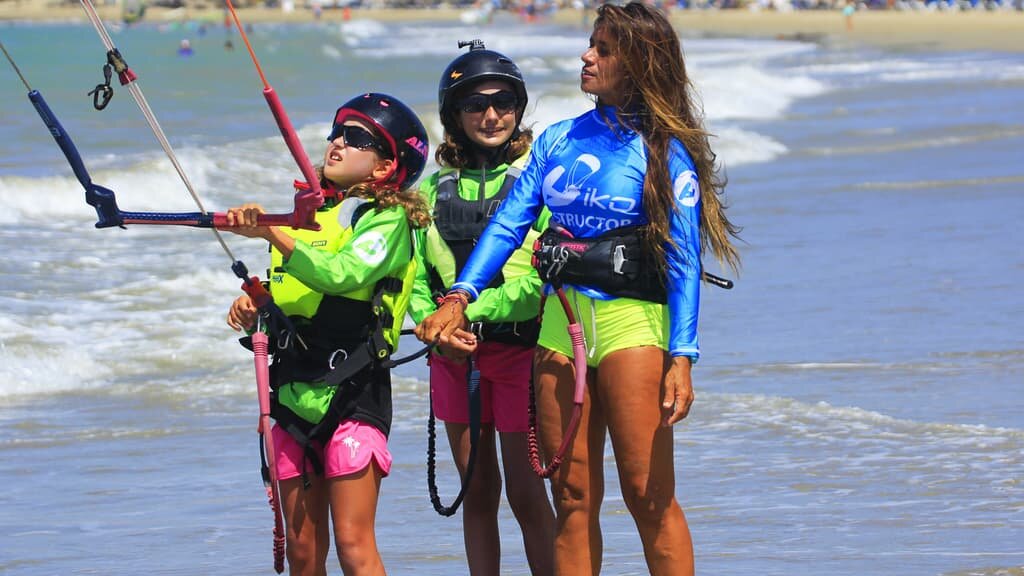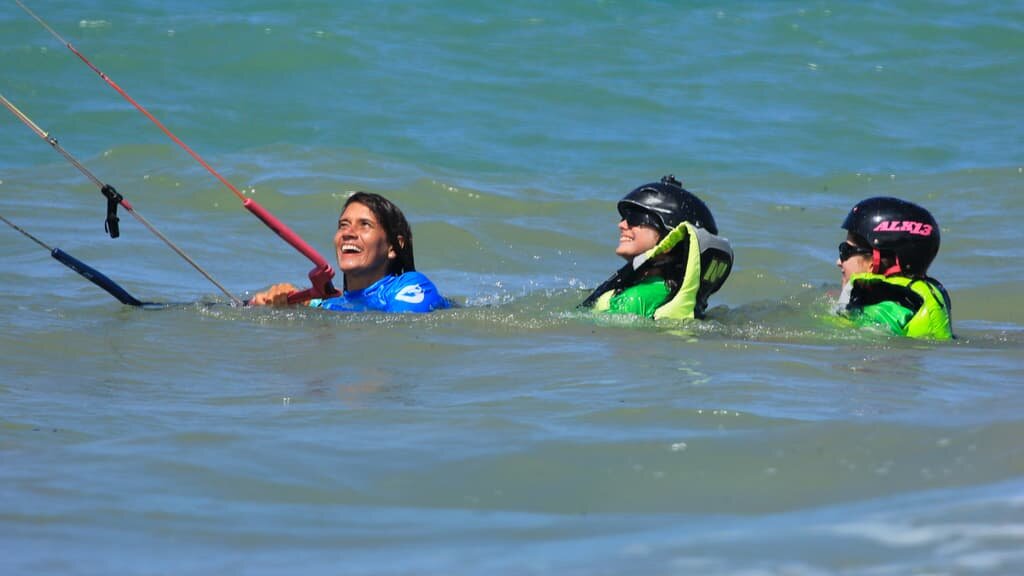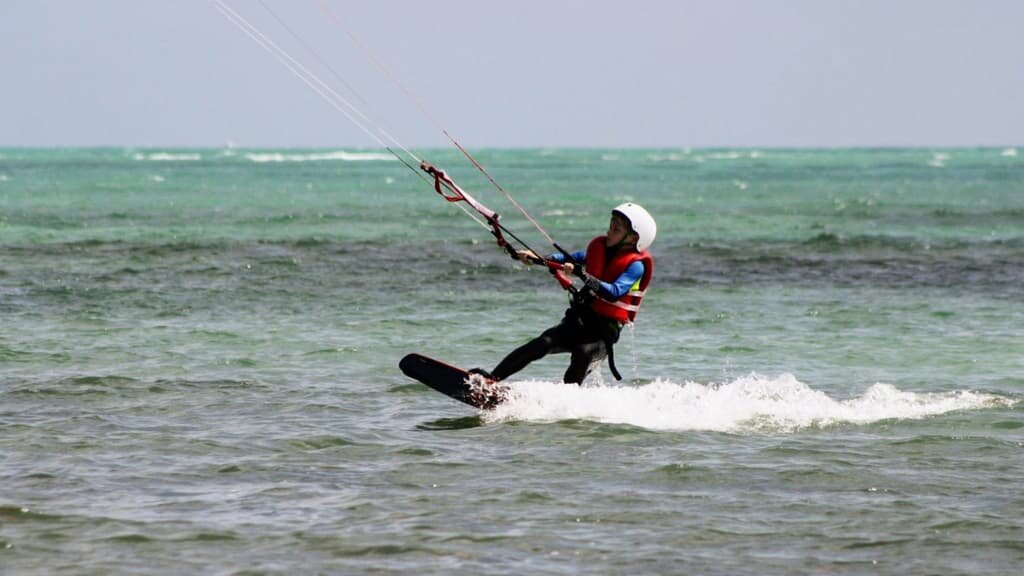Try the new IKO website at https://beta.ikointl.com/

A Guide for Parents on How to Get Their Children to Start Kitesurfing
Back in 2010, when I started kitesurfing, I felt the need to share my passion with someone I can trust and travel with. After completing my IKO certification, I decided to invite my best friend and his 8 years old son Kyle at the beach. I wanted my friend to see my new addiction in action, hoping he would also want to learn kitesurfing.
As soon as I landed my kite, to my surprise, the one running to me with excitement was his son Kyle. “Can I try?” he said with sparkles in his eyes. This was certainly not the outcome I was expecting! I started to laugh and took Kyle’s hand as we walked back to his dad on the beach.
My friend finally got into kitesurfing years after this day, but at that time he asked me if Kyle could learn at his age, if it was even safe for children to kite, or who could actually teach him?
As I had a very little kitesurfing experience at that time, I didn’t know all the answers to these questions. But I redirected my friend to the closest Affiliated IKO Center and that is how Kyle started his kitesurfing journey and became one truly skilled rider (and now kites with his dad!).
If you are a parent and you want to get your children involved in kitesurfing, what are the right steps to take? If you are already kitesurfing yourself, is it wise to teach your own children? What about the benefits of learning kitesurfing as a kid? As an IKO Instructor Level 3 with many hours of experience teaching children (and a parent myself), I can now answer all these questions for you in this article.

I’m interested to get my child to start kitesurfing!
“What is the right age for my kid to learn to kitesurf?”
Actually, there is no age limit in learning how to fly a kite, but if we want to provide a more accurate answer we should take in concern more the weight than the age, 30 kgs (65lbs) is the minimum weight at which a child can start kitesurfing
We find that kids five to six years old can learn to fly small trainer kites on land, but there isn’t a general rule when they are mastering the sport very well, as this depends on their physical condition, maturity and experiences.
“Is learning kitesurfing safe for children?”
If we look at the latest equipment, kitesurfing has never been safer. Modern equipment allows for the complete depower of the kites, incredibly simple and easy to activate quick release systems, cutting edge design.
Children need a different approach than adults and of course need more attention. Reputable organizations like IKO not only have set high-quality standards in coaching but also take care of the reeducation of the instructors, providing special courses on how to teach and behave to children with amazing results.
Of course, there is an inherent risk in kitesurfing which we cannot ignore. A child though who has been correctly supervised to learn and accept its personal limits, learnt and practiced all safety aspects, will make safety the most important factor in every session and will be able to manage as much of the risk this sport offers.
“Can I teach my own kids how to kitesurf?"
Even if a parent is an experienced kitesurfer, it is not recommended to try and teach their kids by themselves. Any parent should book a lesson with a certified IKO instructor, not only for safety reasons but also because the kid will react differently to a teacher.
As it isn’t easy to find equipment for children, you should book the lessons with an affiliated IKO Center where you will find the appropriate equipment for your kids’ size (harness, wetsuit, kites), as well as safety equipment like a helmet and a life vest. Moreover, with an IKO Instructor, the parents can learn how to assist their child and be responsible in many aspects such as spot and conditions assessment, equipment, safety procedures and so on.
“What are the prerequisites for a child to start kitesurfing?”
It is absolutely essential for a child to start kitesurfing to be able to swim proficiently, not be afraid of water and of course to have the willingness to learn.

I decided to book kitesurfing lessons for my child
“I intend to travel to take kitesurf lessons, what should I take in concern?”
If you intend to travel you can check the training calendar on the IKO website and you can ask any questions at the IKO Center you are going to book your lessons. If your child is under 12 years old, the most important thing is to call the school and make sure there is at least one IKO Instructor that has passed the “Teaching to Children’ eCourse. This can also be verified on the instructor’s profile on the IKO website.
“At what time should I book the lessons, and how long does a course last?”
We need to consider the child’s needs, psychology and the general emotional well being as this will be the barometer for the lesson.
It is recommended to book the lessons in the morning or late afternoon and avoid mid-day when it is hot and the sun is strong. In general, a course lasts 2 hours but as kids usually do not have the same endurance as an adult, you can book the lesson for less time.
“What should I expect in terms of progression for my child?”
A big factor of success for children to learn to kite is parents managing their own expectations in regards to their kid’s progression. It is very unlikely that a three-day course during the holidays will not be enough for a child to become a fully independent kitesurfer. We have to let the child play, explore and learn at its own pace.
Because children can get easily disappointed, lose confidence and in the end quit, during the first steps we need to be encouraging with a positive and constructive approach whatever the achievement may be.
“What are the benefits of learning kitesurfing as a kid?”
Nowadays, children prefer sedentary activities like TV and video games, teaching kitesurfing to childrenis a great way to promote a healthy lifestyle.
Children learn about their world by playing. Physical activity and free play contribute to children's physical and cognitive development.
In addition, kitesurfing teaches children cooperation, sharing, working in a team and being part of a community, skills that help them in their socialization process.
By learning to kitesurf, children are getting involved in nature from a young age; they learn how to interact and treat the natural environment, which helps them build and develop environmental consciousness for the future.
In general, kitesurfing teaches children important life skills such as self-reliance, self-confidence, independence and social interaction.
Conclusion
Kitesurfing is an amazing sport that is still growing; it is of utmost importance for the evolution of the sport to educate our children so that we all enjoy the benefits.
The youth are our future, and by instilling good safety values, we can enjoy riding with our kids. Remember to book the lessons with an IKO Center and if you have any more questions, feel free to contact them!
Author: Chris Gkekas
.png)

